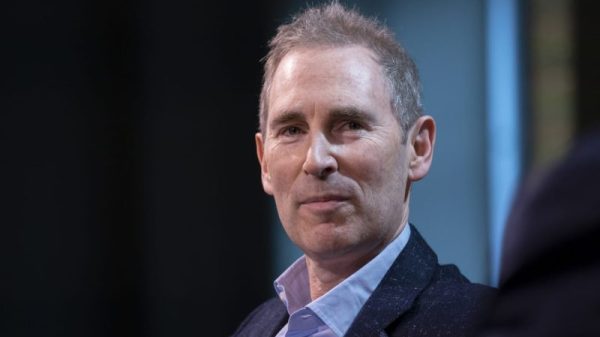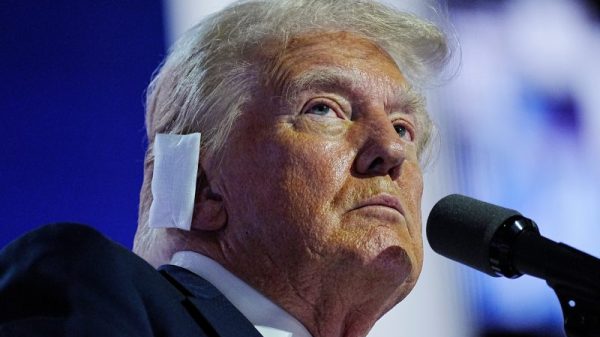
Minnesota Gov. Tim Walz (D), Vice President Kamala Harris’s newly announced running mate, has had an unusually long and involved relationship with China, one that Republicans have seized upon as a line of attack in the face of rising antipathy among voters toward China.
Both Republican and Democratic leaders have promised to further toughen the country’s stance on Beijing if elected, especially when it comes to trade, but growing bipartisan concern about China’s rise has fueled anti-China sentiment across large swaths of American society, polls show.
Walz’s selection Tuesday has brought new attention to candidates’ approach to China.
Republicans have tried to suggest that Walz, who moved to China in 1989 to teach for a year, would be soft on Beijing. Richard Grenell, who served as an ambassador in the Trump administration, on Tuesday called Walz “pro-China,” adding that “Communist China is very happy” with his candidacy.
But Walz, 60, has spent much of his political career critical of the Chinese government’s actions, particularly on human rights and democracy.
Walz first encountered China when he went on a Harvard-run teach abroad program in 1989 and spent a year teaching English and American history at Foshan No. 1 High School in the southeastern Chinese province of Guangdong. “China was coming, and that’s the reason that I went,” Walz told the Hill in 2007.
It was a very different time in China. “I was treated exceptionally well,” Walz told Nebraska’s Star-Herald upon his return in 1990. “There was no anti-American feeling whatsoever.”
But there were also concerning events. On June 4, 1989, joyful pro-democracy demonstrations in Beijing’s Tiananmen Square turned deadly when Chinese authorities violently crushed the protests.
When Walz married fellow teacher Gwen Whipple five years later, they got married on June 4. “He wanted to have a date he’ll always remember,” his wife told a Nebraska newspaper at the time. They went to China on their honeymoon.
After returning to the United States, where he worked as a public high school teacher, the Walzes set up a company, Educational Travel Adventures, that coordinated summer trips to China almost every year through 2003. As of 2016, according to Walz, he had visited China about 30 times.
Elected to the House of Representatives in 2006, Walz, who has a master’s degree in genocide studies, championed multiple bills that censured China’s human rights record and served on the Congressional-Executive Commission on China, which focuses exclusively on human rights.
In 2009, he co-sponsored a resolution condemning the arrest of Liu Xiaobo, a Chinese activist and Nobel Peace Prize laureate who was arrested for subverting state power. And in 2016, he met Tibet’s exiled leader the Dalai Lama, who China considers a separatist. More recently, as governor, he has criticized China for “siding” with Russia on the Ukraine war.
#tbt to 2 years ago, a life-changing lunch with @DalaiLama. We talked about humility, patience, and compassion. I try to embody these values every day in my work. pic.twitter.com/UnaEyy0GOI
— Tim Walz (@Tim_Walz) March 15, 2018
On China, Walz “has a much longer history than most people in Washington,” said Jeffrey Ngo, a pro-democracy activist from Hong Kong now based in Washington.
While many lawmakers from both parties have in recent years positioned themselves as critical of China, Ngo said few have centered their arguments on human rights and democracy, emphasizing instead the threat that China poses in trade, geopolitics and security. “With Governor Walz, it has always been about human rights,” he said.
Chinese analysts on Wednesday were ambivalent about Walz and whether, if elected, he would help stabilize U.S.-China relations.
Walz seems like a “senior American politician” and his time in China could help the Democratic ticket “make more pragmatic China-related policies instead of relying on ideology, stereotypical views and pure ignorance,” said Tang Xiaoyang, chair of the department of international relations at Tsinghua University in Beijing.
But Shen Dingli, a Shanghai-based scholar of international relations, said Walz’s keen understanding of China may “make him more difficult for the Chinese government to deal with,” in particular citing Walz’s criticism of China’s handling of the democracy movement in Hong Kong.
Chinese state-run media on Wednesday noted Walz’s connections to China but did not mention his advocacy on human rights issues.
On the Chinese social media platform Weibo, some users saw his time in China as indication he might be friendlier toward the country. “Without Walz and his connection with China, Harris might take a tougher stance against China,” posted Qiu Zhenhai, founder of a Hong Kong-based think tank.
But Zha Daojiong, a professor at the Institute of South-South Cooperation and Development at Peking University, said he disagreed. Policy regarding China “has a ready and rich template among the two political parties in America” that is not easily influenced by a single political figure, said Zha.
Would Walz’s history of criticizing China’s human rights record sour relations further between the two countries? Also unlikely, said Zha. Walz is “not the only prominent American to have such a background,” he said.
Zhu Feng, director of the Institute of International Studies at Nanjing University, said he believes Walz could have a “more constructive” view on China than other American politicians but that his influence on his party’s — and his country’s — overall positioning vis-à-vis China seems limited. “The Republican Party has already used Walz’s connection to China to attack him, which could even force Walz to take a tougher stance on China,” Zhu said.
Ngo, the Hong Kong activist, said he didn’t think it was likely Walz would stray from what have been his central concerns in China over the last three decades.
In 2016, a group of pro-democracy Hong Kong activists that included Ngo visited Washington to lobby their cause with U.S. officials. This was during the lame duck period after Trump had been elected and no lawmakers accepted the activists’ invitation to speak at an event on Hong Kong — save one: Walz.
The following year, Walz was one of two lawmakers in the House to sponsor the Hong Kong Human Rights and Democracy Act, which eventually passed in 2019. “The fact that he supported it when very few people did and that his support was sustained — that’s different and that’s who he is,” Ngo said. “My hope is that the Democratic Party leans into it,” he added.
Pei-lin Wu contributed to this report.





























